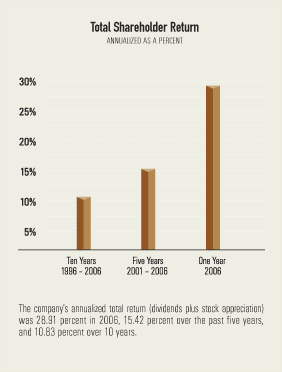|
Designing Around the Core
Though we've continued to deliver excellent results in the face of volatile gas prices, we know that higher gas costs are hard on customers. As a utility we can't control commodity prices, but we do have an obligation to customers and shareholders to manage capital and operating costs. That means accepting nothing less than operational excellence in every part of our business. Last year, we made significant progress toward that goal.
 In our drive to improve, we started the year by benchmarking our operational practices against other high-performing peer utilities. NW Natural is good at many things, but we also knew others were doing some things better. In evaluating our operating model and comparing best practices, we confirmed that NW Natural's core business is defined by three key processes: acquiring customers, serving customers and delivering gas. Our review examined in detail how specific functions are interrelated and could be performed more efficiently. In our drive to improve, we started the year by benchmarking our operational practices against other high-performing peer utilities. NW Natural is good at many things, but we also knew others were doing some things better. In evaluating our operating model and comparing best practices, we confirmed that NW Natural's core business is defined by three key processes: acquiring customers, serving customers and delivering gas. Our review examined in detail how specific functions are interrelated and could be performed more efficiently.
Redesigning our operations was not simply about cost cutting, nor asking people to do more with less. Budgets can be cut to meet short-term goals, but that by itself is seldom effective over the long term. What we needed was a better way to deliver services - a model that would position NW Natural to be competitive in the marketplace in the years ahead, provide the greatest value possible to customers, and deliver the stability and growth shareholders expect. I believe our redesign delivers on all counts, and the results of 2006 are the first indications of our progress.
Redesigning our operations around core processes better aligns accountabilities, creates greater centralization and ensures increased standardization - all of which lead to greater efficiency. Using our resources and personnel more efficiently means significant changes in such areas as new construction, where we will outsource work to contractors to a greater degree over the next few years. Our own crews will continue to perform construction work that requires more customization and other special needs.
Over the next several years, our restructuring should allow us to reduce the number of positions at NW Natural by about 15 percent. We believe we can achieve this reduction largely through attrition and a voluntary severance program.
None of this has been easy, but we're a company that believes in shaping its own future, and in the long term that serves the best interests of our employees as well as customers and shareholders. We pledged from the start to communicate changes openly, clearly and respectfully - and we have.
Challenges and Opportunities Ahead
Our new model will better position NW Natural to face the challenges and opportunities ahead. Given the ongoing tight balance between supply and demand, we expect natural gas prices to remain an issue in the near term. But we have continued to help mitigate volatility by adapting our gas purchasing and hedging strategies to respond to market fluctuations.
For example, our Mist storage facilities and our gas purchasing strategies allowed us to take advantage of falling prices at summer's end, locking in a substantial portion of our gas supplies at lower prices. The move captured millions in savings, allowed us to cut projected customer rate increases in half and - under Oregon's purchased-gas adjustment incentives - delivered one-third of the savings to our bottom line.
Sometimes challenges can provide new opportunities. As long as price volatility continues, gas storage and pipeline infrastructure expansion become even more highly valued. That's part of our incentive to further grow underground gas storage capacity at Mist. It's also why we're exploring the opportunity with TransCanada to build the proposed Palomar pipeline.
Increasingly, global warming is taking center stage as a key challenge for our industry. Even before last year's change in control of Congress, new legislation regulating greenhouse gases was receiving serious consideration. Now the drive to reduce emissions will likely increase.
On this issue we have not been bystanders; we've already taken steps to embrace the challenge. In 2004, I was appointed co-chair of Oregon's Global Warming Task Force. I also currently chair the American Gas Association's Committee on Climate Change. And as a company, we have begun to position ourselves for coming changes.
|